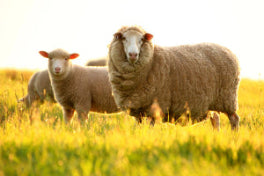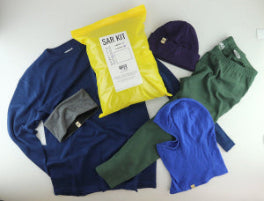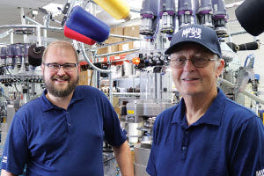
SUSTAINABLY SOURCED MERINO WOOL
At Minus33, we believe that protecting the environment is not about taking a political stance, it is simply about protecting the natural places that we love to visit, explore, and live in. As a small family-owned company, we are doing as much as we can to do our part to help make the apparel industry a better place. Part of our commitment to the environment is transparency. If there is a question you want answered that is not listed on this page feel free to contact us.
OEKO-TEX® STANDARD 100 certified
OEKO-TEX STANDARD 100 is a globally recognized certification system for textiles that are safe from harmful substances. The standard applies to raw, semi-finished, and finished textile products, as well as their accessories. The STANDARD 100 label is awarded to products that have passed safety tests for over 1,000 harmful substances, Including PFAS. The standard also includes stricter human ecology requirements and laboratory tests for items that come into more direct contact with the skin.
The Scope of our certification includes the following:
Knitted base layers, pullovers, shirts, pants, leggings, briefs, underwear, hats, head bands, neck warmers and balaclavas made of 100 % wool or wool/polyamide/ elastane as well as socks made of wool/polyamide/ elastane, reactive piece dyed, yarn dyed and top-dyed; including accessories (sewing thread, elastic tape, drawstring, lace, non-woven interlining, metal and plastic button, snap fastener, zipper [with or without TPU puller], printed label, heat transfer label); produced using components partly pre-certified according to OEKO-TEX® STANDARD 100.
WOOLMARK® CERTIFIED
We are proud to announce that our products are Woolmark certified, meeting the highest standards for quality and performance. Achieving this certification means undergoing rigorous testing by Woolmark to ensure exceptional reliability:
Fiber Content Verification: Woolmark assesses the fiber content of our products to guarantee the purity and quality of the wool used. Colorfastness Testing: Products are exposed to intense light for up to 10 hours to confirm colors remain vibrant and long-lasting. Durability and Strength Testing: Woolmark pushes, pulls, and stretches our products to their physical limits to measure durability, pilling resistance, and construction strength. Care Testing: Products are washed in unforgiving conditions to ensure resistance to shrinkage and shape retention, making them easy to care for. Stain Resistance Testing: Woolmark tests our products against common challenges like coffee, oil, alcohol, and makeup to ensure they withstand everyday use. This certification underscores the superior quality of our products, giving you confidence in every purchase.The Scope of our certification includes the following:
Knitted Garments-Socks, Stockings, Tights; Knitted Garments-Shirts Blouses (Garments); Knitted Garments-Suiting, Trousering, Legging (Garments). Excluding all Blaze Garments.
16 CFR Part 1610 | Standard for the Flammability of Clothing Textiles
When the job brings you close to heat, sparks, or open flame, you need clothing you can trust. Our Minus33 Merino Wool fabrics meet the requirements of 16 CFR Part 1610, the U.S. Standard for the Flammability of Clothing Textiles, set by the Consumer Product Safety Commission (CPSC). This certification proves our fabrics are built for safety and performance where it matters most.
During official flammability testing, both our Midweight 100% Merino Wool (235 GSM) and Microweight 85% Merino Wool (145 GSM) fabrics earned a Class 1 Normal Flammability rating, the safest level possible. Both fabrics scored DNI (Did Not Ignite) in all test categories, showing complete resistance to ignition under controlled flame exposure.
This means that during regular use, the fabric will not catch fire or melt. Merino wool’s natural flame resistance provides dependable protection in demanding work environments. You can focus on the job knowing your clothing has been tested, certified, and proven to meet federal safety standards.
The Scope of our certification includes the following:
All of our Midweight 100% Merino Wool (235 GSM)
All of our Microweight 84 % Merino Wool, 12 % Nylon, 4 % Spandex, (145 gsm)

Packaging:
Change Plastic for Good®
Change Plastic for Good® produces innovative poly bags designed to reduce plastic waste.Their technology allows plastic to break down naturally, leaving no harmful microplastics behind. These bags are made out of an organic material called BDP®. BDP® accelerates the biodegradation of plastics in microbe-rich, biologically active environments. Minus33 Merino Wool has partnered with Change Plastic for Good® to use these sustainable poly bags for our packaging, reinforcing our commitment to environmental responsibility. For every bag produced, Change Plastic for Good® donates to A Plastic Ocean Foundation on our behalf. This switch aligns with our mission to minimize our ecological footprint while delivering high-quality Merino wool products.
Other Certifications Our Suppliers Hold
Our suppliers carry multiple certifications so you can be assured that they are trusted, responsible, and high-quality. Our commitment to ethical and sustainable practices is reflected in the certifications our suppliers hold:
Wool/Textile Ethics & Quality
- Responsible Wool Standard (RWS): Addresses the welfare of sheep and the land they graze on.
- AWTA, LTD: Australian Wool Testing Authority Limited, providing testing and certification services for wool products.
- ISO 9001: International Organization for Standardization's standard for quality management systems.
Business & Social Ethics
- BSCI (Business Social Compliance Initiative): Committed to improving working conditions in the global supply chain.
- WRAP (Worldwide Responsible Accredited Production): Focuses on lawful, humane, and ethical manufacturing.
- GOTS (Global Organic Textile Standard): Ensures the organic status of textiles, from harvesting of the raw materials through environmentally and socially responsible manufacturing.
- SMETA (Sedex Members Ethical Trade Audit): Encompasses all aspects of responsible business practice.
Where Are Your Products Made?
We have a long history of woolen textile manufacturing, with all of our Mountain Heritage socks made right here in New Hampshire. Although most socks are made in the USA, many of our other products are manufactured in Vietnam, Romania, Bulgaria, China, India, Sri Lanka, and Cambodia.
We take pride in vetting our suppliers thoroughly to ensure they are certified both environmentally and socially, while also delivering great quality materials to create our products. We are always doing our best to evaluate our supply chains and make the best decisions possible. We make sure the suppliers we work with are trusted, high quality, and ethically sound. We regularly travel to visit our suppliers and ensure things are running according to our standards.
Learn more about our USA-made socks
Learn more about our history in woolen textiles since 1916
Proudly Supporting non profits nationwide
We are proud to support a variety of nonprofit organizations nationwide.
Our biggest partnerships include:
Mount Washington Observatory - Home of the world's worst weather.
Search & Rescue Groups - We provide used wool clothes to help with rescue situations across the country.
HikeSafe - Mountain safety, education and rescue cards.
Recycling In the office & Warehouse
We reuse and recycle our office materials as much as possible. We have established an office sustainability committee where employees can participate and bring forward ideas on how the company can contribute to the environment. Employees are encouraged to volunteer, and we get together to pick up trash on National Trails Day and Earth Day.
Recycling in sock manufacturing
Waste due to sock manufacturing is repurposed as much as possible - top-quality socks are sold in our Mountain Heritage Sock Collection, seconds are donated to local SAR teams, and raw material waste is held to be recycled. We are always looking into more efficient and less wasteful practices.
Have Your Products Reached the End of Their Life?
When your products reach their end of life, you have a few options to make sure they meet a sustainable end.
Repair: The most sustainable solution is to repair your product whenever possible to keep it in use. Try to patch holes, or repurpose it into another type of garment when you can. Check out our wool patch kit.
Compost: Wool is compostable, so you can add your garment to your compost pile. It may help speed up the process if you cut it up into smaller pieces. Also, the thread and labels are currently not compostable, so be sure to remove them. We are researching alternatives for the thread and labels.
Donate: We will gladly take your product back to our recycling program. If your product is still in wearable condition, we can use it in our SAR Kit program. If your product is not wearable, please check locally first to see if you can recycle it at a facility near you. If not, we can send it to be recycled. For more information on these programs, visit this page.
FAQ
Polybags protect the products during shipping, which reduces waste by keeping products from getting destroyed and therefore thrown away. Polybags also help reduce transportation costs, emissions, and overall shipping impact by allowing us to fit more products in smaller spaces. We are currently researching and testing eco-friendly polybag alternatives that can still achieve all of these benefits. Right now, our product polybags are made from 100% recycled materials.
How to Responsibly Dispose of Your Packing Materials
Polybags can usually be repurposed in thin-film recycling locations, commonly found at grocery stores or places like Walmart. Paper and cardboard such as tags and boxes can usually be recycled locally, check your town or city's recycling program for more information.
All of our sheep live in Australia. Growers who sign contracts to provide wool to Minus33 agree not to use harmful practices, on their sheep. We ensure our wool supply is purchased from ethical, mulesing-free farms. The sheep are not harmed when their wool is harvested; they need to have their coats regularly sheared to keep them healthy, much like getting a haircut. Shearing is an essential part of sheep care, preventing them from overheating and ensuring their overall well-being.
All of the suppliers we work with carry up-to-date certifications that ensure factory workers are treated fairly and safely, make a livable wage, and do not use forced or child labor. See above Business/Social Ethics certifications our suppliers hold.
We transport our products as efficiently as possible. We primarily ship our products by sea from our suppliers, which is the most environmentally-friendly way to get them here. All of the inventory you see on our website is located in Ashland, NH at our warehouse. From Ashland, we ship to our various retailers and customers as needed. Our retailers are incentivized to place larger orders ahead of time so we can ship more efficiently, and they also have the option to opt-in to a more eco-friendly packaging solution which also helps us ship more products in a smaller footprint.
